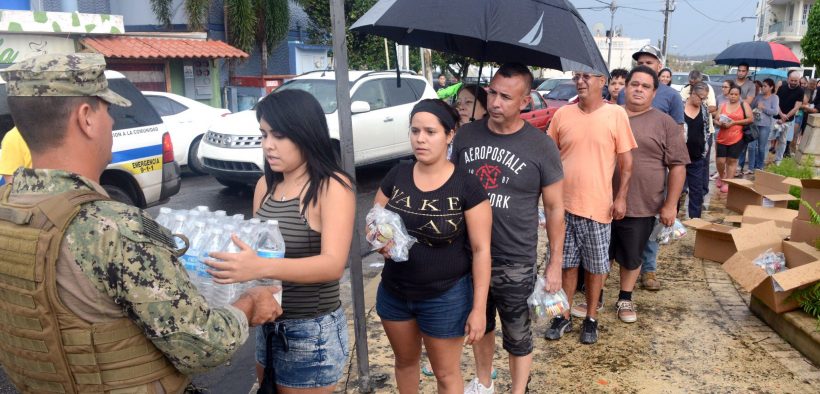HUD Officials Knowingly Stalled Puerto Rico Aid

HUD officials purposefully withheld funds allocated for Puerto Rico aid after Hurricane Maria claiming the island was too corrupt to appropriately manage the full amount of funding.
Two years after Hurricane Maria devastated Puerto Rico, the island has received only a third of the roughly $43 billion Congress allocated for recovery efforts. Last week, top officials at the Department of Housing and Urban Development (HUD) admitted that they knowingly stalled Hurricane Maria related Puerto Rico aid, an illegal act that several lawmakers pledged to investigate.
“HUD’s chief financial officer, Irv Dennis, and David Woll, the department’s principal deputy assistant secretary for community planning and development, made the admission Thursday before a House Appropriations subcommittee,” NBC reported Friday.
HUD ‘Fails to Comply With the Law’ by Withholding Puerto Rico Aid
Despite issuing disaster-recovery funding notices for 17 states, which allowed them to draft a plan and begin using their federal aid for recovery efforts, the agency deliberately failed to issue a congressionally mandated notice to Puerto Rico, stalling desperately needed aid for the U.S. territory.
“HUD did fail to comply with the law,” asserted Rep. David Price, one of the lawmakers who slammed HUD’s illegal decision at the hearing.
“American communities have been waiting far too long for the relief and recovery assistance,” said Rep. Nita Lowey.
The HUD officials argued that the corruption in Puerto Rico’s government demonstrated by the massive protests and resignation of Governor Ricardo Rosello in July made them doubt the municipality’s ability to appropriately manage the funds.
Rep. Katherine Clark, however, pointed out that no indictments were issued against the island’s housing secretary, Fernando Gil-Enseñat, or the department he leads during the island’s political upheaval in July, undermining HUD’s defense. Both HUD officials agreed that Gil-Enseñat is an “honorable head of housing” at the hearing.
“As the HUD Inspector General’s letter clearly states, HUD officials misled congressional staff about the conclusions of the IG’s review of Vivienda’s capacity to administer disaster recovery funds in an attempt to justify their violation of the law,” Rep. Norma Torres told NBC News (Vivienda is the name of Puerto Rico’s housing department). “This is unacceptable and I fully expect the department to look into why their staff lied to Congress.”
‘Financial Oversight’ or Modern Day Colonialism?
NBC reports that the funds will likely remain in limbo until HUD appoints a financial monitor for Puerto Rico. Critics are skeptical of any U.S. appointed watchdog to the island’s finances, however:
“No one more than Puerto Ricans want oversight, but what we’ve seen so far doesn’t work,” Miguel Soto-Class, founder and president of the Center for a New Economy, a nonpartisan think tank, previously told NBC. “We don’t want punishment disguised as oversight.”
This is because Puerto Rico’s history as a sugar-producing colony of the United States is inextricable from its second-class treatment under the federal government.
Puerto Rico was already suffering from a financial crisis before it was devastated by Hurricane Maria. Although Puerto Rico is the largest U.S. municipality to ever go bankrupt, it cannot declare bankruptcy under Chapter 9 because of its legal designation as a territory, unlike Detroit, the second largest municipality to go bankrupt, as explained by the American Prospect’s Ellen Brown.
Puerto Rico’s $73 billion debt is largely held by vulture funds who bought it “for pennies on the dollar,” Brown explains, yet creditors are adamant in demanding interest payments from the devastated territory.
Instead of bailing out Puerto Rico, whose debt could be wiped out by one month of the quantitative easing program that the Fed used to rescue the Too-Big-To-Fail banks, the U.S. imposed the Financial Oversight and Management Board in 2016 to dictate the territory’s public policy. The board imposed austerity measures including healthcare cuts, pension cuts, slashed minimum wages, and the closure of hundreds of schools, in order to focus Puerto Rico’s revenue on paying hedge funds and other creditors.
Democrat Debates Ignore Hurricane Maria, Puerto Rico Aid Issues
As Mother Jones’ Aj Vicens wrote last Wednesday, Puerto Rico’s ongoing plight was totally absent from the most recent Democratic debate.
“For too long, presidential candidates of both parties have ignored the light of the people of Puerto Rico,” Federico A. de Jesús, senior advisor of the Power 4 Puerto Rico coalition, told Mother Jones. “At a time when President Trump has targeted our community with insults and going as far as illegally withholding disaster relief funds duly approved by Congress, merely criticizing Trump will not cut it.”
More American citizens were killed by Hurricane Maria than the 9/11 terrorist attacks, leading critics to argue that the total failure of Puerto Rican relief efforts must be given more attention by the media and in future debates.
“On the day Puerto Rican advocacy groups called out Democratic candidates for their lack of interest in Puerto Rico, once again I am not surprised that the island gets ignored,” Julio Ricardo Varela, founder of Latino Rebels and co-host of the “In The Thick” political podcast, told Mother Jones. “It’s as if Democrats don’t really care to have an actual debate about colonialism, debt, austerity, and political status.”









